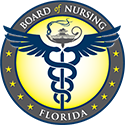Nursing Education Programs FAQs
How do I verify a school or program?
The list of approved CNA training programs can be found here.
The list of approved LPN and RN prelicensure nursing programs in Florida, as well as their current status such as Approved, Accredited, or Probation can be found here. You can search and compare by county, program name, or degree offered.
The status of a closed or terminated program may be verified via the Department of Health’s License Verification website here (you will enter the program name in the “Business Name” field).
Please note: the information available will be limited. Interested parties may email the Florida Board of Nursing at MQA.Nursing@flhealth.gov for additional information including closure and termination dates.
Are all nursing education programs required to submit an Annual Report for Programs in nursing?
No. Approved programs are mandated to submit an annual report for programs in Nursing each year by November 1, pursuant to section 464.019(3). Florida Statutes. This subsection does not apply to accredited programs.
(3) ANNUAL REPORT.—By November 1 of each year, each approved program shall submit to the board an annual report comprised of an affidavit certifying continued compliance with subsection (1), a summary description of the program’s compliance with subsection (1), and documentation for the previous academic year that, to the extent applicable, describes:
(a) The number of student applications received, qualified applicants, applicants accepted, accepted applicants who enroll in the program, students enrolled in the program, and program graduates.
(b) The program’s retention rates for students tracked from program entry to graduation.
(c) The program’s accreditation status, including identification of the accrediting agency.
(9) APPLICABILITY TO ACCREDITED PROGRAMS.—
(a) Subsections (1)-(3), paragraph (4)(b), and paragraph (5)(b) do not apply to an accredited program.
(b) If an accredited program ceases to be accredited, the educational institution conducting the program:
1. Within 10 business days after the program ceases to be accredited, must provide written notice of the date that the program ceased to be accredited to the board, the program’s students and applicants, and each entity providing clinical training sites or community-based clinical experience sites for the program. The educational institution must continue to provide the written notice to new students, applicants, and entities providing clinical training sites or community-based clinical experience sites for the program until the program becomes an approved program or is closed under subparagraph 3.
2. Within 30 days after the program ceases to be accredited, must submit an affidavit to the board, signed by the educational institution’s president or chief executive officer, which certifies the institution’s compliance with subparagraph 1. The board shall notify the persons and applicable entities listed in paragraph (7)(c) if an educational institution does not submit the affidavit required by this subparagraph.
3. May apply to become an approved program under this section. If the educational institution:
a. Within 30 days after the program ceases to be accredited, submits a program application and review fee to the department under subsection (1) and the affidavit required under subparagraph 2., the program shall be deemed an approved program from the date that the program ceased to be accredited until the date that the board approves or denies the program application. The program application must be denied by the board pursuant to chapter 120 if it does not contain the affidavit. If the board denies the program application under subsection (2) or if the program application does not contain the affidavit, the program shall be closed and the educational institution conducting the program must comply with paragraph (7)(b).
b. Does not apply to become an approved program pursuant to sub-subparagraph a., the program shall be deemed an approved program from the date the program ceased to be accredited until the 31st day after that date. On the 31st day after the program ceased to be accredited, the program shall be closed and the educational institution conducting the program must comply with paragraph (7)(b).
What is the NCLEX Next Generation (NGN), and where can I find related resources?
The Next Generation NCLEX (NGN), is a new version of the NCLEX that is designed to assess clinical judgement in nursing candidates. Next Generation NCLEX candidate resources are available at this link: https://www.nclex.com/next-generation-nclex.page.
Where can I find a list of all the approved and accredited pre-licensure nursing education programs in Florida?
A list of all the approved and accredited pre-licensure nursing education programs in Florida are available on website entitled “Compare Florida Prelicensure Nursing Education Programs”.
What is the difference between an “approved” and an “accredited” pre-licensure nursing education program in Florida?
An “approved” nursing education program is a program for the prelicensure education of professional or practical nurses that is conducted in Florida at an educational institution that is approved and regulated under s. 464.019, Florida Statutes. Approved RN nursing education programs are required to obtain accreditation within five years after enrolling the program’s first students, pursuant to S. 464.019(11), Florida Statute.
An “accredited” nursing education program, as defined by s. 464.003, Florida Statutes, is a program for the prelicensure education of professional or practical nurses that is conducted in the United States at an educational institution, whether in Florida, another state, or the District of Columbia, and that is accredited by a specialized nursing accrediting agency that is nationally recognized by the United States Secretary of Education to accredit nursing education programs Accreditation Commission for Education in Nursing (ACEN), Commission on Collegiate Nursing Education (CCNE)) or National League for Nursing Commission for Nursing Education Accreditation (NLN CNEA).
Will my choice of attending one rather than the other impact my eligibility to sit for the licensing examination?
Graduates of both approved and accredited nursing education programs are eligible to apply to the Florida Board of Nursing for licensure by examination.
Accredited programs included on the Florida Board of Nursing’s comparative website are programs that have a physical presence in the state of Florida. Program status of out-of-state nursing education programs may be verified through the specific Board of Nursing that issued approval or through a national nursing accrediting body (ACEN, CCNE, or NLN CNEA).
What is the significance of nursing education program NCLEX passage rates and the NCLEX National Average passage rate?
The NCLEX or National Council Licensure Examination is the national licensing examination for practical and registered nurses. Quarterly and cumulative passage rates for first time test takers are calculated and published by a contracted testing service and are made available to the Florida Board of Nursing and are posted on the website.
The NCLEX National Average passage rate is the average number of all member first time test takers for a reporting period, calculated by the National Testing Service using the test takers’ scores during the reporting period, to determine the average of the conglomerate scores.
Pursuant to s.464.019, F.S., the Florida Board of Nursing monitors these passage rates to ensure the achievement of Florida approved nursing education program graduates. Approved nursing education programs must achieve a graduate passage rate that is not lower than 10 percentage points less than the average passage rate for graduates of comparable degree programs who are United States educated, first-time test takers on the NCLEX during a calendar year. An approved nursing education program shall be placed on Approved/probationary status by the Florida Board of Nursing pursuant to s. 464.019 for failure to meet the required passage rates on the NCLEX for two consecutive calendar years.
For more information on NCLEX passage rates or to view individual Florida nursing education program NCLEX passage rates on our interactive website entitled “Compare Florida Prelicensure Nursing Education Programs”, please visit our Education and Training Programs page.
If I graduate from a nursing education program with Approved/probationary status, will I be able to sit for the NCLEX?
Yes. Graduates of nursing education programs with Approved/probationary status are eligible to apply to the Florida Board Nursing for licensure by examination.
Why is a particular nursing education program that I am interested in not coming up on my comparison search on the interactive pre-licensure nursing education program website?
The comparison search data is refreshed nightly and may not reflect information for newly approved or accredited programs. The program may also not be an approved or accredited nursing education program based in Florida. Please contact the Florida Board of Nursing at MQA.NursingEducationCorrespondence@flhealth.gov to confirm the nursing education program status.
What is the difference between the “Accrediting Body” and “Accreditation” categories on the nursing education program comparison website?
The “Accrediting Body” category identifies the specific accrediting agency. The “Accreditation” category indicates the status applied to each nursing education program by the Florida Board of Nursing to indicate whether the program has specialized nursing accreditation, other national or regional educational accreditation, or no accreditation. Nursing education programs may have multiple listings under both categories.
What is “Retention Rate”?
The percentage of the number of students tracked from program entry to graduation.
What is the difference between an A.D.N. program and a B.S.N. program?
Both types of these professional nursing educational programs prepare the graduate for eligibility for licensure as a Registered Nurse. A.D.N. or Associate Degree in Nursing programs are usually two year programs. B.S.N. or Bachelor’s of Science in Nursing degree programs are usually four year programs.
Where can I view the applications for approved nursing education programs submitted after July 1, 2009?
To view an application for an approved nursing education program submitted after July 1, 2009 please visit http://ww10.doh.state.fl.us/pub/bon/
Are all nursing education programs required to submit an Annual Report for Programs in Nursing?
No, ACEN/CCNE accredited programs are exempt from this annual requirement.
Section 464. 019(3), Florida Statutes, states, in part:
… by November 1 of each year, each approved program shall submit to the board an annual report comprised of an affidavit certifying continued compliance with subsection (1), a summary description of the program’s compliance with subsection (1), and documentation for the previous academic year that, to the extent applicable, describes:
(a) The number of student applications received, qualified applicants, applicants accepted, accepted applicants who enroll in the program, students enrolled in the program, and program graduates.
(b) The program’s retention rates for students tracked from program entry to graduation.
(c) The program’s accreditation status, including identification of the accrediting agency.
Section 464.019(5)(b), Florida Statutes, states, in part:
… (b) If an approved program fails to submit the annual report required in subsection (3), the board shall notify the program director and president or chief executive officer of the educational institution in writing within 15 days after the due date of the annual report. The program director shall appear before the board at the board’s next regularly scheduled meeting to explain the reason for the delay. The board shall terminate the program pursuant to chapter 120 if the program director fails to appear before the board, as required under this paragraph, or if the program does not submit the annual report within 6 months after the due date.
To view or download an approved program annual report form, please visit https://floridasnursing.gov/forms/info-affidavit.pdf
Where can I view an approved nursing education program’s annual summary of compliance with s. 464.019, Florida Statutes?
To view an approved nursing education program’s annual summary of compliance with s. 464.019, Florida Statutes, please visit http://ww10.doh.state.fl.us/pub/bon/
How can I find out which nursing education programs in Florida offer courses online?
Nursing education programs may deliver course content through several venues. Please contact the nursing education program directly for this information.
How can I find out which nursing education programs in Florida are LPN-RN bridge programs?
The Florida Board of Nursing does not regulate admission criteria for nursing programs. Please contact the nursing program directly for information on advanced placement opportunities
Where can I find a list of post-licensure/graduate nursing education programs in Florida?
The Florida Board of Nursing does not regulate post-licensure nursing education programs, for example RN-BSN or other advanced nursing degrees. Please contact the Florida Department of Education for this information. www.fldoe.org.
What do I do if I have a complaint about a nursing education program in Florida?
You may consider forwarding your concerns to the Commission for Independent Education (CIE) for further evaluation. CIE receives and processes complaints filed against nursing education programs.
Students may file concerns with the Florida Department of Education, Commission for Independent Education (CIE). Please visit https://www.fldoe.org/policy/cie/student-concerns.stml for information regarding that process. CIE will investigate your concern and assist you if possible. Be advised that they cannot give legal advice or take legal action on your behalf so you may also want to seek legal guidance from an attorney.
The Commission for Independent Education has statutory responsibilities in matters relating to nonpublic, postsecondary, educational institutions. In keeping with the Florida Department of Education’s goal of producing a seamless educational system, some of these functions include consumer protection, program improvement, institutional policies and administration, data management, and the licensure of independent schools, colleges and universities.
Public Elementary or High Schools – Contact the Division of Public Schools
Nonpublic Elementary or High Schools – Contact the Office of Independent Education and Parental Choice
Public Colleges – Contact the Florida College System
Public Universities – Contact the State University System of Florida
Public Vocational-Technical Schools – Contact Career and Adult Education
Nonpublic Postsecondary Institutions – Follow the instructions below
To file a complaint against a nonpublic postsecondary institution in Florida, please write a letter or send an e-mail containing the following information:
- Name of Student (or Complainant)
- Complainant Address
- Phone Number
- Name of Institution
- Location of the Institution (City)
- Dates of Attendance
- A full description of the problem and any other documentation that will support your claim such as enrollment agreements, correspondence, etc.
- The complaint process of the Commission involves contacting the institution to obtain their response to your complaint. If you do not want the Commission to contact the institution you are attending, you must state so in your complaint; however, doing so will greatly hinder the Commission’s ability to assist you with your complaint.
Send Letter To:
Send Letter To:
Commission for Independent Education 325 W. Gaines Street, Suite 1414
Tallahassee, FL. 32399-0400
Or E-mail: cieinfo@fldoe.org
Or Fax: 850-245-3238
Where can I find the Florida law and rules related to nursing education programs?
You may view the Chapter 464, Nurse Practice Act, Florida Statutes, and Chapter 64B9, Rules of the Florida Board of Nursing, Florida Administrative Code, please visit https://floridasnursing.gov/resources/ and http://www.leg.state.fl.us/statutes/index.cfm?App_mode=Display_Statute&Search_String=&URL=0400-0499/0464/0464PARTIContentsIndex.html&StatuteYear=2018
Where can I find the application for a new nursing education program and the annual report?
| The application for a new nursing education program is available on our Practical & Registered Nurse Education Program renewal page. |
How may I contact the Board of Nursing with questions regarding the accuracy of nursing education program information?
E-mail address:MQA.NursingEducationCorrespondence@flhealth.gov
What is the process for placing programs on probation?
Approved or accredited nursing education programs that perform below the minimum standard for NCLEX passage rates for two consecutive calendar years will be placed on probation pursuant to section 464.019(5), Florida Statutes. NCLEX scores for the previous calendar year are released in January of each year.
The program must remain on probationary status until it achieves a graduate passage rate that equals or exceeds the required passage rate for any 1 calendar year.
If a program meets the minimum standard, the program will be removed from probation. A program on probation that fails to meet the minimum standard will be terminated by the Board of Nursing.
Pursuant to Florida law, the Board of Nursing is authorized to extend a program’s probationary status for one (1) additional year if the program demonstrates “adequate progress” towards the “graduate passage rate goal”. Nursing education programs that are placed on probation are required to disclose their probationary status in writing to the program’s students and applicants
Pursuant to Florida law the board shall deny a program application for a new prelicensure nursing education program submitted by an educational institution if the institution has an existing program that is already on probationary status.
What is the significance of nursing education program NCLEX passage rates and the NCLEX National Average passage rate?
The NCLEX or National Council Licensure Examination is the national licensing examination for practical and registered nurses. Quarterly and cumulative passage rates for first time test takers are calculated and published by a contracted testing service and are made available to the Florida Board of Nursing and are posted on the website.
The NCLEX National Average passage rate is the average number of all member first time test takers for a reporting period, calculated by the National Testing Service using the test takers’ scores during the reporting period, to determine the average of the conglomerate scores.
Pursuant to s.464.019, F.S., the Florida Board of Nursing monitors these passage rates to ensure the achievement of Florida approved nursing education program graduates. Approved nursing education programs must achieve a graduate passage rate that is not lower than 10 percentage points less than the average passage rate for graduates of comparable degree programs who are United States educated. An approved nursing education program shall be placed on Approved/probationary status by the Florida Board of Nursing pursuant to s. 464.019 for failure to meet the required passage rates on the NCLEX for two consecutive calendar years (http://laws.flrules.org/2014/92).
For more information on NCLEX passage rates or to view individual Florida nursing education program NCLEX passage rates on our interactive website entitled “Compare Florida Prelicensure Nursing Education Programs”, please visit our Education and Training Programs page.






